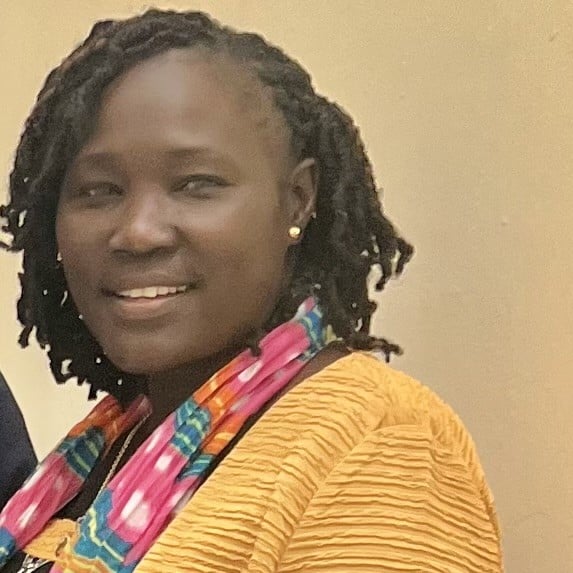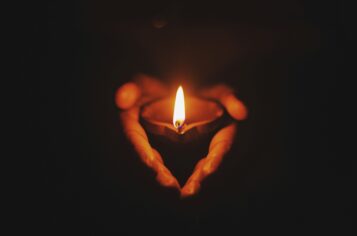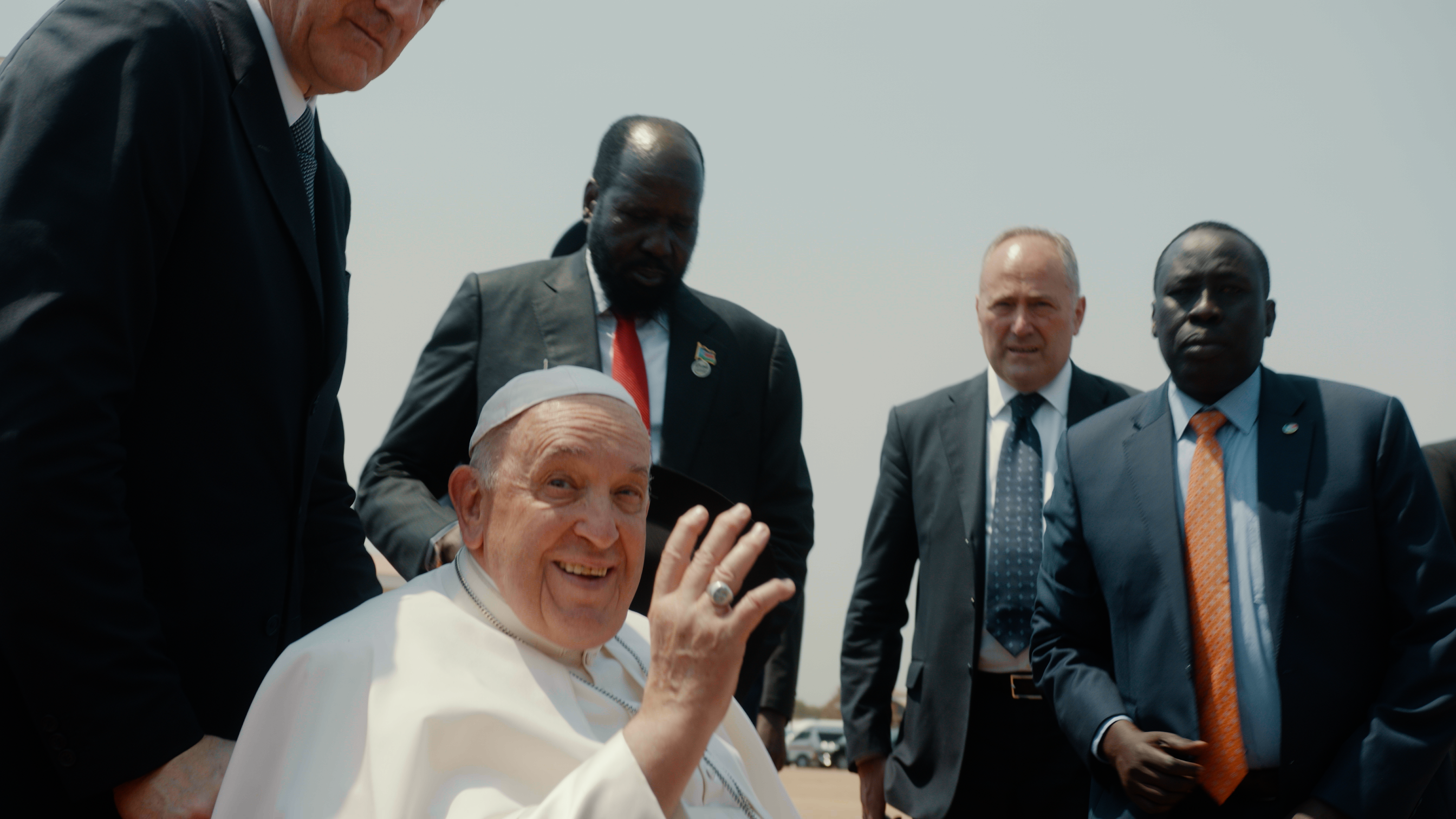
Martha Jarvis, Anglican Communion’s Permanent Representative to the UN and former member of the Difference team, reflects on being present during one of the most memorable gestures of Pope Francis’ 12-year-long pontificate: kissing the feet of South Sudanese leaders as they emerged from a brutal civil war.
No one expected it. The climax of the spiritual retreat for South Sudan’s leaders had always been planned with a degree of formality. The Vatican’s speech writers are some of the best and Pope Francis’ words poured forth with great beauty. South Sudanese leaders sat before the Pope in a circle, alternating between politicians and church representatives, their dark suits and deeply coloured robes creating a striking contrast with his white cassock and the understated, pristine, white walls of his home, Santa Marta.

It was April 2019, and we had been at the Vatican for two days of intense spiritual reflection and bridge-building dialogue. The aim was to create space for God to move in and between the leaders tasked with progressing South Sudan’s peace agreement. The President and First Vice President, who sat in the circle with the Pope, headed up opposing sides of a civil war linked to over 400,000 deaths. They had barely been in the same room together for the last three years after a shoot-out in the capital caused the First Vice President to flee the country, and they still had bitter disagreements about how they should govern. Over the preceding months, others in that circle had cried out in despair at what continued to happen in their country.
The former Archbishop of Canterbury and the former Moderator of the Church of Scotland had worked with the Vatican through major diplomatic restrictions to bring this retreat off. Until a few hours before it started, we didn’t know whether it would go ahead. The closing session was a moment of togetherness – both for the nation and for the church – that was historic and appropriately demure.
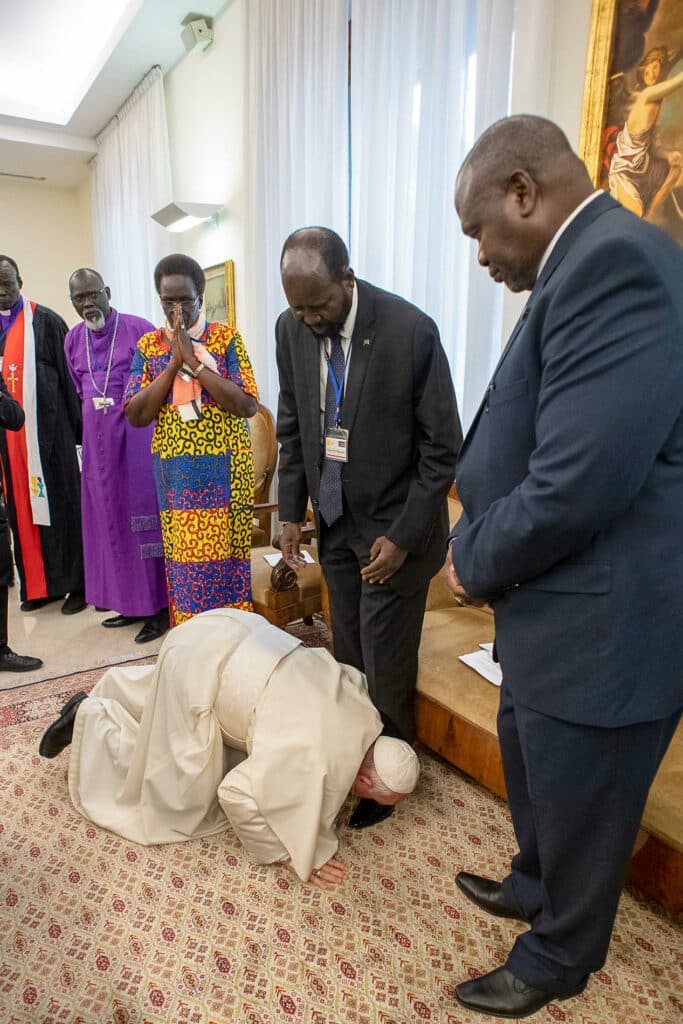
Then everything changed. The Pope stood, laying down the paper copy of his speech and moving out from behind his desk into the centre of the circle. “I ask you as a brother: stay in peace. I am asking you with my heart… There will be struggles and disagreements amongst you but let this be within the community – inside the office, as it were – but in front of the people, hold hands, united; so as simple citizens you will become fathers of the nation.” He moved forward again and stooped uneasily, with the help of his interpreter, until he was kneeling in front of the President and kissing his feet. The room held its breath. A radiance seemed to intensify around the group so that you could almost reach out and touch it. Time was sucked in – shaping itself around the movement of the Holy Spirit. Tears fell onto my cheeks as they did with almost everyone else in the room.
With his words, the Pope had articulated a movement of the heart that diplomats and politicians could not. Each phrase fell with the powerful simplicity of a brother – who loved so deeply and knew this situation so well that he could name things as they were. And with his actions, he had shown as powerfully as any sermon could that we are meant to be one, reconciled, restored people.
The long road of reconciliation
Not everything changed in that moment. The political leaders did go on to form a transitional government and all-out war has, so far, not returned to South Sudan. But the process has been fraught with difficulty. Violence rages in many parts of the country, and the peace agreement again hangs by a thread – with one of the leaders whose feet was kissed under house arrest at the command of another.
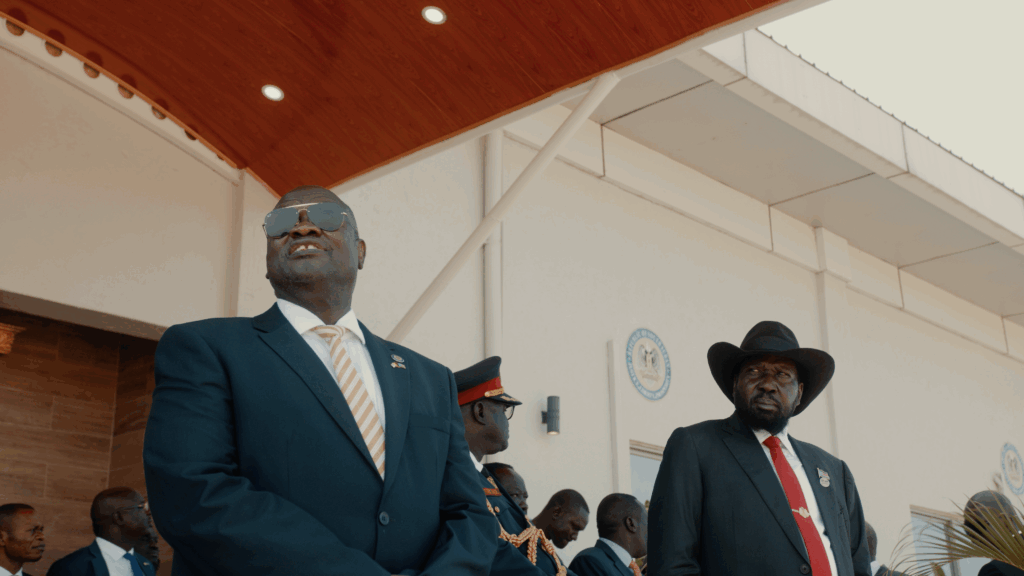
Peace is not a vending machine waiting for the right combination of ‘holy acts’ to release its goods. Peace is messy as well as beautiful, requiring choice and grace at every level of society – choices that are painful and often constrained by history and trauma.
That moment, however, was a powerful representation of what can be done when followers of Jesus commit together to something more than the status quo. In the act of kissing the feet, you can see certain markers of peacemaking that shaped the Pope’s ministry, and from which we can all draw:
Curiosity
Looking beneath the trappings of power to the people within.
In that room in Santa Marta, the Pope didn’t see political leaders in need of a formal speech, nor warlords with blood on their hands. He saw children of God, a brother or sister, to reason with and long for. He saw the humans too behind the statistics of power. Little aside from the pain of real people would have motivated him to pray and speak so consistently about ending the conflict in South Sudan over his time as Pope.

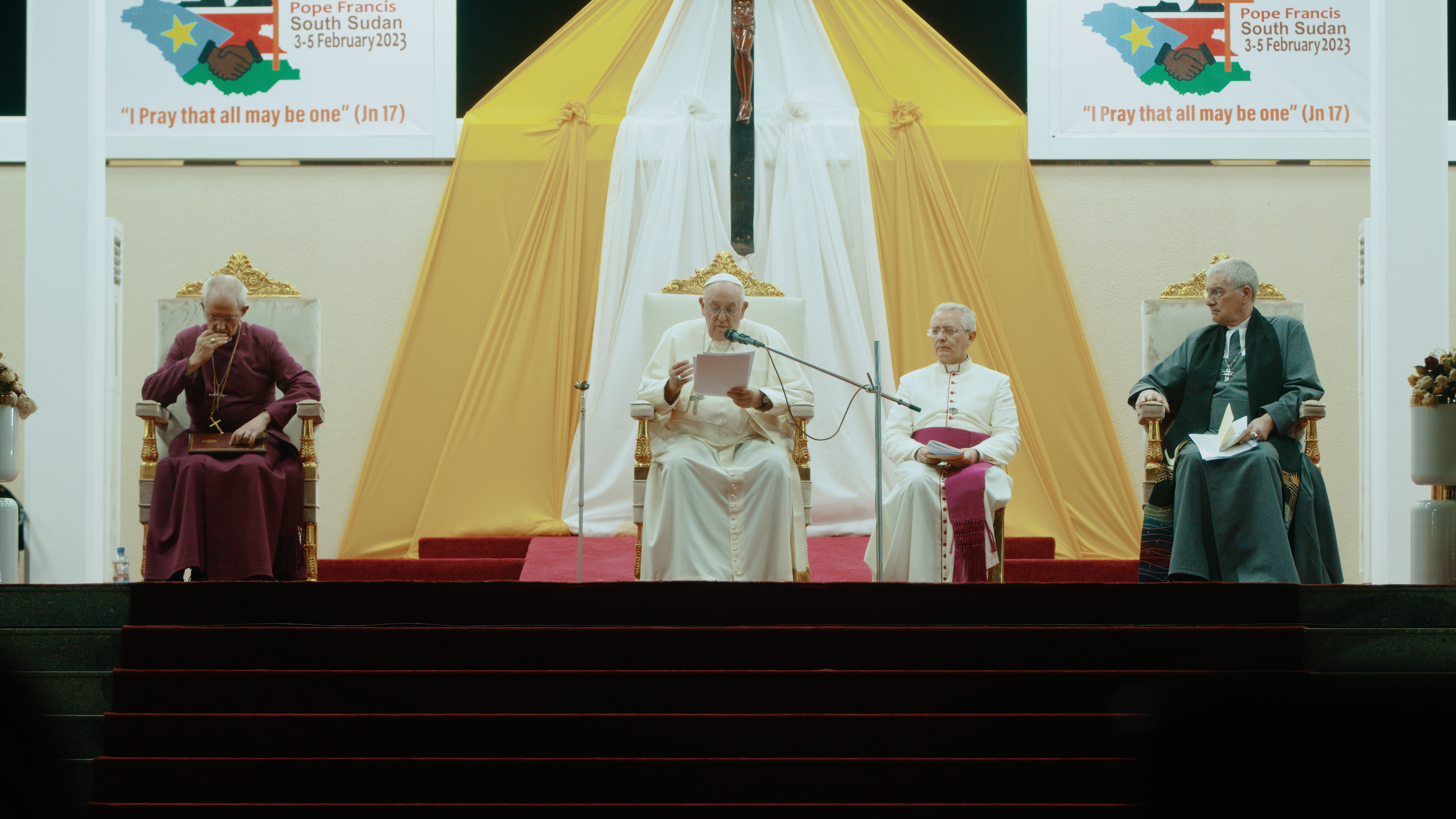

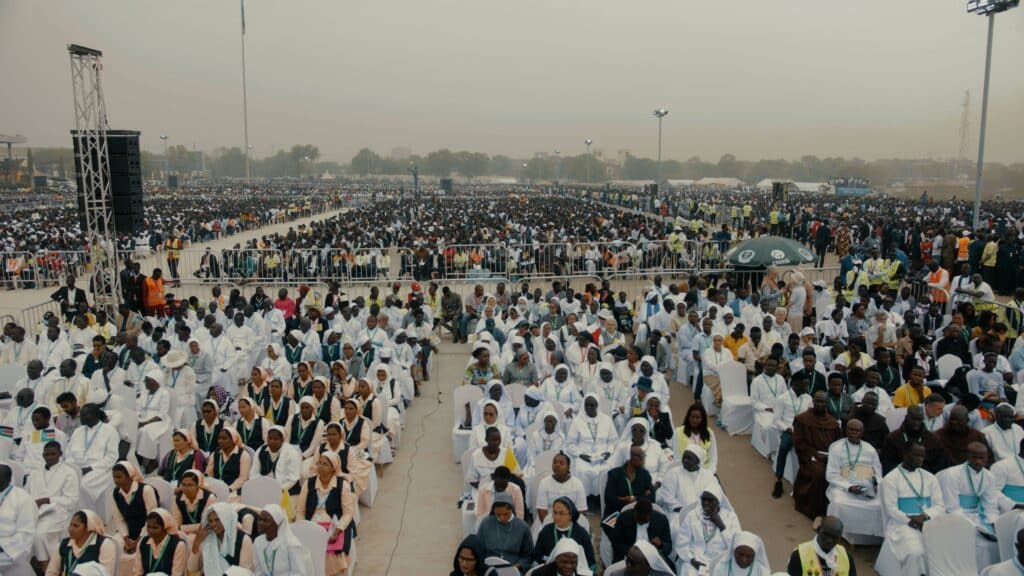
Photo credit: Jonty Herman.
After the retreat at Santa Marta, the Pope, the Archbishop and the Moderator would go on in 2023 to visit South Sudan together in another historic moment – the Pilgrimage of Peace – not because everything was resolved in the conflict, but because it wasn’t. They went to be with a people who remained in fear of conflict and to hold the leaders to account for their response to the retreat.
We can practise this persistent, humanising care in our curiosity about the stories of conflict in our media and in the relationships closest to us.
Presence
Living the scriptures in the present.
The Pope clearly breathed in scripture so deeply that he was able to see, with the Holy Spirit’s guidance, moments when they could be brought to life in the present. There were echoes of Jesus’s actions in his kissing of the leaders’ feet (right down to his insistence ‘permettetemi’ (allow me) when the First Vice President tried to stop him) and yet they didn’t seem trite or rehearsed, but alive – spontaneously fitted to the immediate context.
Interestingly, this moment of presence depended on many other people. I think about Fr. Orobator, the facilitator of the retreat, who prayed South Sudan’s national anthem every day for at least a month before we arrived in Rome. His care, attention and skill were part of creating the holy container within which the Pope could react. Others had a similar impact. They came from sections of the Church that had historically been divided by theology and separated in mission but now weaved the container together through their prayers and actions for peace.
The power of prayer can heighten our presence in the moment. More than that, crossing divides in how we pray can help us reach out wildly in person. In all of this, we need others, praying and working alongside us, to realise the full potential our presence can have.
Reimagining
A willingness to go off-script when love calls.
This is the challenge for every peacemaker, because, at some point, the script of our tribe, nation, or section of the Church will suggest a certain way that is more about continuing the status quo than it is about the bravery and risk of loving as Jesus loved. The Pope was ready to step in when formality and protocol said he should do otherwise.
Likewise, I have known church leaders in towns across South Sudan risk ostracization from their own people because they offered care to another tribe. Despite their own pain, they took seriously Jesus’s words that they should love their enemies, and they protected others in an opposing tribe from revenge attacks. In one case, I know this was the start of a dialogue beginning between the two tribes, which eventually resulted in a peace agreement.
Scripts are often there for good reason, and the Pope and these South Sudanese leaders knew the value of the groups to which they belonged. But they had hope that God could move in rare moments of reimagining that made their risks worthwhile. That is true whether we find ourselves reimagining in the midst of a civil war or in moments of tension in our office, church, or family.
Making peace in a world reeling from division
During his time as Pope, violent conflicts like South Sudan’s became more common. He called for prayer and fasting in response to bloodshed across DRC; he visited Iraq after decades of conflict that shook the country and world order; he made daily phone calls to priests in Gaza sheltering from bombs, gunfire, and hunger; he spoke out boldly (not always in ways that made him popular) after the invasion of Ukraine, and more.
In all of this, the Pope knew he could not ensure transformation. His peacemaking was not motivated by a guaranteed result, but by a call to follow God as the ultimate peacemaker, come what may. This gave his acts genuine and compelling humility. He was a work in progress – a human like the rest of us – allowing God to work through him to open possibilities for peace.
In an article to be published after his death, the Pope wrote: ‘Unfortunately, all too often in human history, those who propose peace are looked upon as weak, while those who arm themselves to the teeth are presented with the allure of being strong and in charge. This is also a great illusion. The one who works for peace is strong. Only the peacemaker sees the world as a place that can be cultivated and improved upon. Only the peacemaker has the patience and foresight to build.’
The Pope’s ministry was defined by a choice to believe in true strength, Christ’s strength, instead of an illusion. It led him to join with unlikely others, powerfully yet imperfectly, to pursue something greater than the status quo. As world politics shift around us, we will see how others make that choice and how it shapes this moment of our history. And we can participate, through our prayers and actions, in showing that peace is worth choosing again… and again.
Pray with us
Jane Namurye, part of our team, previously lived in South Sudan and worked for many years with church leaders – building relationships and promoting peaceful coexistence amongst communities. Jane offers this prayer which we invite you to pray with us:
Eternal God, the Alpha and the Omega, our lives are a gift from you, and you know when to call us home. Thank you for the special gift of Pope Francis who you called back home. His passing is a great loss to our hurting world but a gain with you in our heavenly home.
In his words before he kissed the feet of our South Sudanese leaders, he said, “Stay in peace, I am asking you with my heart…” May his acts of humility, peace, unity and reconciliation continue to echo in the hearts of our leaders in South Sudan and indeed leaders in our divided, conflicted and hurting world today.
We pray that our governments may become stewards of God’s children and shelters to protect citizens that have suffered painful scars of war, in honour of God and Pope Francis.
We pray for women, children, elderly and the vulnerable in South Sudan who have suffered the vicious cycle of violence, that God would remember them.
We pray that those in refuge and internally displaced would safely return to their communities and rebuild their lives in a peaceful South Sudan, in honour of Pope Francis’ holy kiss on the feet of our leaders.
Pope Francis, may your legacy remain in our hearts and the lives you’ve touched in your Peace Pilgrimage to my country, South Sudan, and may your humble spirit continue to rest in peace and rise in glory.
Amen
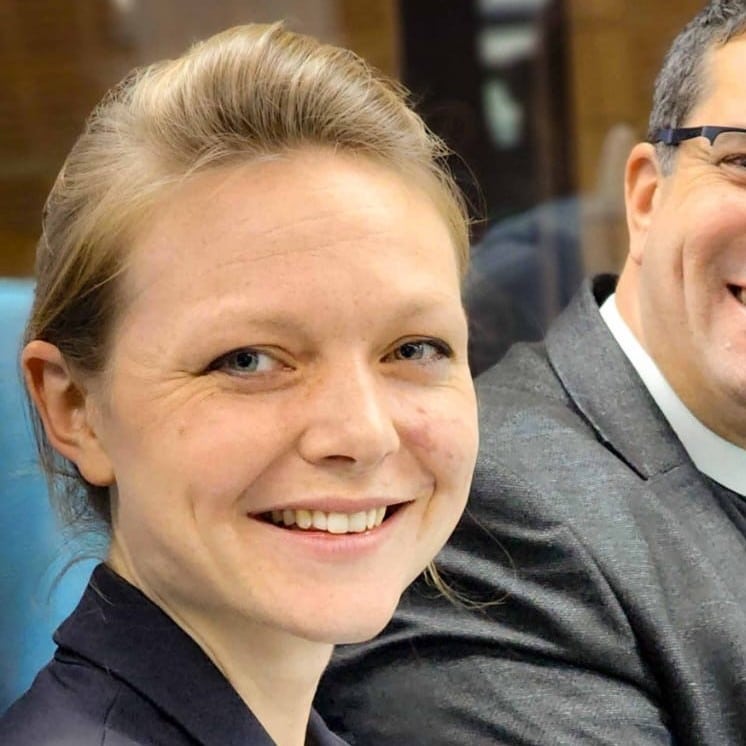
Martha Jarvis is the Anglican Communion’s Permanent Representative to the United Nations. She works with a small team to create bridges between the Church’s work and the UN’s – raising the Church’s voice in international negotiations and creating partnerships between churches and UN teams responding locally to conflict, climate change, and forced movement of people. She previously worked in the Archbishop of Canterbury’s reconciliation ministry, supporting Church-led peacemaking in South Sudan and Mozambique, and managing the international growth of the Difference course.
Jane Namurye is part of the Reconciliation team at Lambeth Palace, alongside Difference, where she coordinates Women on the Frontline, focusing on women as reconcilers. Jane has experience in peacebuilding, engaging, enabling and equipping clergy wives and women leaders across the Anglican Communion to become peacemakers and reconcilers. She previously worked with church leaders in South Sudan building relationships and promoting peaceful coexistence among communities, and also worked as a journalist reporting on humanitarian issues.
